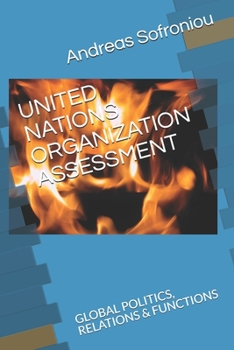United Nations Organization Assessment: Global Politics, Relations & Functions
The United Nations as an international organization was established on October 24, 1945. The United Nations was the second multipurpose international organization established in the 20th century that was worldwide in scope and membership. Its predecessor, the League of Nations, was created by the Treaty of Versailles in 1919 and disbanded in 1946. Headquartered in New York City, the UN also has offices in Geneva, Vienna, and other cities. Its official languages are Arabic, Chinese, English, French, Russian, and Spanish. Assessment of the UN political relations and functionsThe United Nations is the only global international organization that serves multiple functions in international relations. The UN was designed to ensure international peace and security, and its founders realized that peace and security could not be achieved without attention to issues of rights-including political, legal, economic, social, environmental, and individual. Yet the UN has faced difficulties in achieving its goals, because its organizational structure still reflects the power relationships of the immediate post-1945 world, despite the fact that the world has changed dramatically-particularly with respect to the post-Cold War relationship between the United States and Russia and the dramatic increase in the number of independent states. The UN is a reflection of the realities of international politics, and the world's political and economic divisions are revealed in the voting arrangements of the Security Council, the blocs and cleavages of the General Assembly, the different viewpoints within the Secretariat, the divisions present at global conferences, and the financial and budgetary processes.Despite its intensively political nature, the UN has transformed itself and some aspects of international politics. Decolonization was successfully accomplished, and the many newly independent states joined the international community and have helped to shape a new international agenda. The UN has utilized Charter provisions to develop innovative methods to address peace and security issues. The organization has tried new approaches to economic development, encouraging the establishment of specialized organizations to meet specific needs.It has organized global conferences on urgent international issues, thereby placing new issues on the international agenda and allowing greater participation by national states, organisations and individuals.Not-withstanding its accomplishments, the United Nations still operate under the basic provision of respect for national sovereignty and non-interference in the domestic affairs of states. The norm of national sovereignty, however, runs into persistent conflict with the constant demand by many in the international community that the UN take a more active role in combating aggression and alleviating international problems. For example, the United States appealed to the issue of national sovereignty to justify its opposition to the Convention on the Rights of the Child and the International Criminal Court. Thus it is likely that the UN will continue to be seen by its critics as either too timid or too omnipotent as it is asked to resolve the most pressing problems faced by the world's most vulnerable citizens.Global relations and the world powersModern international law, sometimes called the law of nations, has evolved over the last 400 years. The three major sources of international law according to Article 38 of the Statute of the International Court of Justice are: -International conventions or treaties; -International customs; and the -General principles of law as recognized by civilized nations.
Format:Paperback
Language:English
ISBN:B0915BFPQ3
ISBN13:9798728850663
Release Date:March 2021
Publisher:Independently Published
Length:176 Pages
Weight:0.54 lbs.
Dimensions:0.4" x 6.0" x 9.0"
Customer Reviews
0 rating





